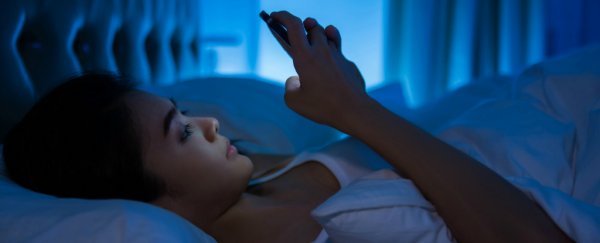Having access to 24-hour high-speed internet is one of the greatest things ever. But it has its costs. A new study has found that broadband is a factor in modern sleep deprivation, linked to less sleep as well as lower quality sleep when it's used near bedtime.
Insufficient sleep is extremely common, and it has been shown to negatively effect both health and cognitive performance.
The bad news is, the problem is only getting worse. In numerous advanced countries, the number of people getting less than the recommended 7 to 9 hours of sleep is increasing.
While there is growing concern among experts that excessive electronic use is wreaking havoc on our sleep patterns, until now, there has been little evidence to suggest broadband internet was directly connected.
To better understand the way high-speed internet impacts on sleep routines, a new German study has compared technology use and broadband data to national surveys on sleep.
The study found that individuals with broadband access tend to sleep 25 minutes less than their counterparts. What's more, these individuals are significantly less likely to sleep between 7 to 9 hours and are less satisfied with their sleep overall.
"High-speed Internet makes it very enticing to stay up later to play video games, surf the web and spend time online on social medias," the authors wrote.
For each generation, the temptations of technology were somewhat different.
Among teenagers and young adults, for instance, it was found that playing video games and watching television is an important factor for sleep deprivation.
But among older users, it was computer and smartphone use that was strongly correlated with a shorter length of sleep.
"Digital temptations may lead to a delay in bedtime, which ultimately decreases sleep duration for individuals who are not able to compensate for later bedtime by waking up later in the morning," says lead author Francesco Billari, an expert in demography at Bocconi University, Milan.
Overall, the results of the study were driven by younger people who use technology at bedtime the night before a work, family or school commitment.
As fascinating as the study is, the data on the sleeping behaviour of teenagers is still quite limited. While the results suggest the "digitalization of the bedroom" may have large detrimental effects on sleep and academic performance, the findings are not causal.
The researchers are calling on future research to further explore the behavioural mechanisms underlying internet addiction and how to promote healthier sleep practices.
"Given the growing awareness of the importance of sleep quantity and quality for our health and productivity, providing more information on the risks associated with technology use in the evening may promote healthier sleep and have non-negligible effects on individual welfare and well-being," the authors conclude.
The study has been published in the Journal of Economic Behavior and Organization.
